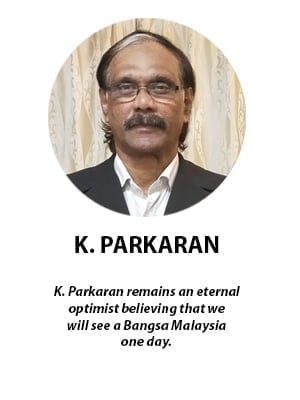
Do not underestimate the civil service and establishment vote bank enjoyed by all governments of the day in Malaysia. That includes members of the military and the police, most of whom become pensioners when they retire. Altogether, there are about a million of them.
Add the 700,000 already on the pensions list, and the government has to contend with an estimated 1.7 million voters who could be inclined to punish the ruling coalition at elections if changes are made to end the pension scheme, such as a suggestion to switch to the EPF scheme.
Discontent could extend wider afield, to include relatives, friends and those in their social circles.
It is no wonder that none of the governments since independence have dared think of pension reforms, treating the matter as a sacred cow for decades.
The funny part is that Cuepacs and some other related groups are totally against any change although former minister Khairy Jamaluddin clearly suggested that only new entrants into the government service from next year should be placed in the EPF scheme.
Two-time prime minister Dr Mahathir Mohamad was among the earliest to warn that the civil service pension scheme was a time bomb that will have serious repercussions if not addressed. But then he failed to do anything on his watch over nearly 23 years.
Obviously, Umno, which was in power for decades until 2018, knew that this vote bank comprises mostly Malay votes and touching it will be akin to disturbing the hornet’s nest.
The unity government is in a more precarious situation now, as most early and postal voters, comprising mainly civil servants, have been voting for Perikatan Nasional in recent elections.
Khairy and Cuepacs are now embroiled in a spat after the former minister described the current scheme as a ticking time bomb that will become an unbearable burden if it is not reformed urgently.
Cuepacs president Adnan Mat described the suggestion as absurd and unwarranted while Khairy responded by making a stronger statement in response. He gave some figures that all economists or financial experts will agree Khairy is making sense.
Khairy said Putrajaya forked out about RM30 billion to pay pensioners in 2022, making up nearly 10% of the government’s expenditures in its annual budget. This figure is projected to hit RM46 billion in a mere seven years.
While Cuepacs, the umbrella body for civil service unions, is right in protecting those already in the scheme, one wonders why it is totally against doing away with it for those entering the service from next year.
If implemented, those eyeing government jobs in future will be fully aware that they will not be receiving pensions after they retire. This is being fair and no one should complain.
Leading democracies in the world have done away with the automatic pension scheme which awards government retirees a minimum of 50% of their last drawn basic pay. In Malaysia, after much political pressure from Cuepacs, which conspicuously dangles its vote bank when making demands, it was raised to 60% in 2009 if one has served at least 30 years.
With most civil servants joining the government between 20 to 25 years of age, nearly all of them are known to retire after serving 30 to 35 years, making them eligible for the maximum 60% pension.
In the UK, the government did away with the automatic pension scheme and started contributing an amount equivalent to 2.3% of a government servant’s annual salary to the retirement fund. This total then becomes the final amount from which monthly pensions are distributed.
India reformed its national pension scheme in 2004, and converted it into an EPF-like plan with both the government and civil servants contributing 10% each of their last drawn salaries into the super annuity scheme. To be fair, the Indian government only applied it to new entrants, similar to what Khairy is suggesting.
A maximum of only 60% of total savings may be withdrawn as a lump sum and the remainder annuitised into a monthly withdrawal scheme.
Australia, too, made massive changes to its pension system, with no separate scheme for government employees. In its superannuity scheme, the government currently contributes 11% of the basic wages of private and public sector employees. The amount will be raised to 12% in 2025.
These amounts can then be withdrawn for specific purposes such as settling mortgages, home renovations or approved investments. But the withdrawal is conditional and applicants must have valid reasons. They can also opt for a monthly withdrawal scheme.
In addition, it has a non-contributory Age Pension scheme for all Australian citizens and permanent residents which is based on their current earnings, if any, and ownership of assets savings. There is no separate scheme for government employees.
These advanced countries have moved by leaps and bounds in their pension schemes with much political will and economic sense. But in Malaysia, all governments have been ignoring this time bomb by mollycoddling the civil servants and future entrants – presumably just for their votes.
Chances are Khairy is likely to be back in the government some day whether one likes it or not. If that happens, I would like to see him pushing for this reform with the gusto he is showing now. - FMT
The views expressed are those of the writer and do not necessarily reflect those of MMKtT.



No comments:
Post a Comment
Note: Only a member of this blog may post a comment.